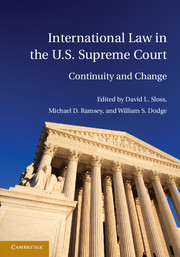Book contents
- Frontmatter
- Contents
- List of Contributors
- Table of Cases
- Acknowledgments
- Introduction
- PART I FROM THE FOUNDING TO THE CIVIL WAR
- PART II FROM THE CIVIL WAR TO THE TURN OF THE CENTURY
- 2 Treaties in the Supreme Court, 1861–1900
- 3 Customary International Law in the Supreme Court, 1861–1900
- 4 International Law as an Interpretive Tool in the Supreme Court, 1861–1900
- 5 A Social History of International Law: Historical Commentary, 1861–1900
- PART III FROM THE TURN OF THE CENTURY TO WORLD WAR II
- PART IV FROM WORLD WAR II TO THE NEW MILLENNIUM
- PART V INTERNATIONAL LAW IN THE U.S. SUPREME COURT IN THE TWENTY-FIRST CENTURY
- V.A TREATIES AFTER 2000
- V.B CUSTOMARY INTERNATIONAL LAW AFTER 2000
- V.C INTERNATIONAL LAW AND CONSTITUTIONAL INTERPRETATION AFTER 2000
- V.D INTERNATIONAL LAW AND STATUTORY INTERPRETATION AFTER 2000
- V.E INTERNATIONAL LAW AND THE WAR ON TERROR
- VI CONCLUSION
- Index
- References
3 - Customary International Law in the Supreme Court, 1861–1900
Published online by Cambridge University Press: 05 July 2011
- Frontmatter
- Contents
- List of Contributors
- Table of Cases
- Acknowledgments
- Introduction
- PART I FROM THE FOUNDING TO THE CIVIL WAR
- PART II FROM THE CIVIL WAR TO THE TURN OF THE CENTURY
- 2 Treaties in the Supreme Court, 1861–1900
- 3 Customary International Law in the Supreme Court, 1861–1900
- 4 International Law as an Interpretive Tool in the Supreme Court, 1861–1900
- 5 A Social History of International Law: Historical Commentary, 1861–1900
- PART III FROM THE TURN OF THE CENTURY TO WORLD WAR II
- PART IV FROM WORLD WAR II TO THE NEW MILLENNIUM
- PART V INTERNATIONAL LAW IN THE U.S. SUPREME COURT IN THE TWENTY-FIRST CENTURY
- V.A TREATIES AFTER 2000
- V.B CUSTOMARY INTERNATIONAL LAW AFTER 2000
- V.C INTERNATIONAL LAW AND CONSTITUTIONAL INTERPRETATION AFTER 2000
- V.D INTERNATIONAL LAW AND STATUTORY INTERPRETATION AFTER 2000
- V.E INTERNATIONAL LAW AND THE WAR ON TERROR
- VI CONCLUSION
- Index
- References
Summary
In the period 1861 to 1900, the U.S. Supreme Court under the Chief Justiceships of Roger Taney, Salmon Chase, Morrison Waite, and Melville Fuller presided over a jurisprudential transformation of American law. But its impact on the development of U.S. foreign relations law has not been as well studied. Bracketed between the extraordinary contributions of the Marshall Court and the emergence of the United States as a world superpower in the aftermath of World War I, the period from the Civil War to the end of the nineteenth century has been an underappreciated epoch in studies of the legal dimensions of America's place in a global order. Separated in time from both the originalist moment of the Founding and the first years of the New Republic, as well as from the twentieth century's Pax Americana, the late 1800s seem like a backwater of jurisprudential insight for contemporary understandings of the relationship between international law and U.S. law.
This seems particularly so with the role of customary international law. Partly, of course, this may be a function of customary international law's amorphous character and function in the matrix of legitimate sources of law under the U.S. constitutional order, which I discuss in more detail later. But there is also an empirical challenge to any study of U.S. Supreme Court cases involving customary international law: in some periods of the Court's operation, there are not many of those cases, and those that are reported are of an ambiguous and problematic nature.
- Type
- Chapter
- Information
- International Law in the U.S. Supreme Court , pp. 89 - 123Publisher: Cambridge University PressPrint publication year: 2011
References
- 1
- Cited by

